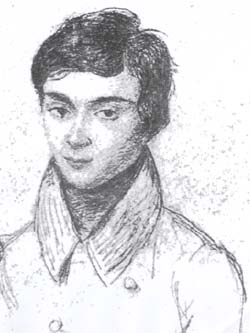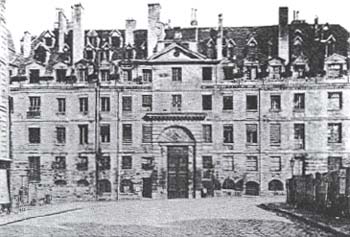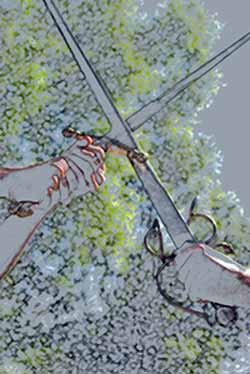If we were to ask ourselves what mathematicians have done for us, or what kinds of people it is who do mathematics, we could look for some answers at the life of Evariste Galois. This young man, who lived a short but mathematically productive life, displayed genius and stupidity all rolled into one. Mathematics can seem like a cold, abstract subject, but this passionate and vital young man gives us another model of the mathematician.
Family background

The young Evariste Galois
Evariste Galois was born on the 25th of October 1811 to Nicolas-Gabriel Galois and Adelaide-Marie Demante.
The Galois family had embraced revolutionary ideals from the very beginning of the French revolution in 1789. Nicolas-Gabriel was a cultivated man, an intellectual, saturated with philosophy, a passionate hater of royalty and an ardent lover of liberty. For a while, he was the mayor of the little village Bourg-la-Reine, where Evariste Galois was born. Adelaide-Marie Demante was known as a woman of strong character with a mind of her own, generous, with a marked vein of originality, and very well read. There is no record of mathematical talent on either side of the family.
In 1823, at the age of 12, Galois was sent to school for the first time, entering the lycée of the Louis-le-Grand in Paris. Lycées had only been set up in France around 1802. In a lycée, the 1st year was called the 6th class, and the last class was called the 1st class. This last class was also called the rhetorique, and the first class called the philosophie.
At the time, France was split between two warring factions. On the left were the most fanatical supporters of the ideals of the Revolution: liberté, egalité and fraternité (liberty, equality and fraternity), and on the right were the royalists who supported the rule of the kings. Louis-le-Grand was also split in two. The students were mostly of revolutionary stock while most of the teachers, especially the headmaster, were royalists.
The daily routine at Louis-le-Grand

Louis-le-Grand
The pupils' day began early. At 5.30am a bell was rung in the unheated dormitories, each containing 40 beds placed at exactly 1 metre apart. After a quick wash, the pupils had to put on their uniforms in silence.
Once dressed, and after assembly prayers, the pupils had to go straight to their classrooms. The idea was that a period of study would increase their appetite for breakfast. The classrooms had no desks, but instead steps on which the pupils sat with their books and exercise books on their laps. Lighting was limited to one candle for every two pupils. The wooden teacher's desk was on a high podium, rather like a pulpit, so that the teacher had complete control over class discipline.

The uniforms of Louis-le-Grand at the time of Evariste Galois
At 7.30am, after about two hours of study, breakfast was brought directly to the classrooms. It consisted of water and dry bread, and had to be eaten silently - and quickly, as the time permitted for breakfast was only 15 minutes. At 8am, lessons recommenced and continued until midday. Lunch was served in the refectory and eaten in absolute silence. During the meal, one of the tutors would read extracts from morally uplifting writings, on which the boys could later be questioned. Lunch was normally gruel, meat, and green vegetables. Afternoon lessons began at 2pm and continued until 6pm, with a short break for a snack at 4.30. After 6pm, students had to go to a service in the chapel, which ended at 7.30. After chapel service, dinner was served in the refectory, and the students went to bed at 8.30.
With this kind of school timetable, it is hardly surprising to discover that students frequently rebelled - and were expelled almost as frequently.
Rather than the daily routine, it was the revolutionary political ideals of Galois that got him into trouble with the school authorities. He had a stubborn conviction of right and wrong, and neither fear nor severity of discipline could extinguish his sense of justice and fair play.
Learning and doing mathematics

Galois's mathematical appetite was awakened when he was 14 years old, during the rhetorique class at Louis-le-Grand. His mathematics teacher chose the geometry book written by Legendre as the class textbook, and Galois read it from cover to cover in just a few days.
However, he never took to algebra the same way he took to geometry, possibly because at the time there was no book on algebra that could compare to Legendre's geometry book. Later on he learnt algebra by reading the works of Abel, the master of algebraic analysis at the time.
Galois was gifted with the ability to carry out the most difficult mathematical investigations almost entirely in his head. This helped him with neither teachers nor students. Their insistence on details always left him exasperated. And he frequently lost his temper.
Higher education - setbacks

not needed
In June 1828, when he was 17 years old and without adequate preparation, Galois sat the competitive entrance examinations of the École Polytechnique. It was the best university in France, and, filled with revolutionary fervour, it held a special allure for the young Galois.
He failed.
The following year, when he was 18, Galois sat the examinations again. It was normal practice that pupils could sit the École Polytechique examinations at most twice. So Galois had to pass the exams this time if he were ever to attend.
One part of the exams was an oral test where pupils were quizzed by two professors of the institution. But Galois's habit of working entirely in his head put him at a serious disadvantage before a blackboard. During the oral exam one of the professors ventured to argue a mathematical point with Galois. The man was both obstinate and wrong. It was a heated argument, Galois lost his temper and threw the eraser at the professor's face. Suffice to say, that was the end of his attempt to get into the Polytechnique.
More setbacks
Later, Galois gained admission to the École Normale, which was set up to train future teachers. But he wasn't a happy student. His revolutionary ideals collided with those of the Normale, so he joined the revolutionary parties of the school and in 1830 was expelled. His father died soon after.
With no stipend (grant) and no father, Galois had no money to live on (there was no social security in those days). Later, Galois put up a notice in the front of a grocery shop opposite the Normale, announcing a private class in higher algebra meeting once a week with him as the tutor. Some students came, but after a while they found the subject way over their heads, and they stopped coming.
After this, with no job, no school, no money, Galois devoted all his energies to revolutionary politics, and writing mathematical memoirs on higher algebra.

Galois was challenged to a duel on 29th May 1832. The practice of settling disputes by duels was very common in those days, and not only in France. As late as 1838, members of the American legislature were engaging in duels to settle disputes. These disputes ranged from trivial things such as who stole a chicken to more serious affairs such as politics. This practice went on until the First World War.
There are various theories about why the duel was called: that Galois was lured into the duel by a state secret agent, that it was a duel called between fellow republicans, or that it was to settle a love dispute between Galois and a sometime friend. The truth is, we don't know - but we do know that Galois wrote two letters the night before the duel. One, addressed as a "Letter to all Republicans", Galois wrote:
I beg patriots and my friends not to reproach me for dying otherwise than for my country. I die the victim of an infamous coquette. It is in a miserable brawl that my life is extinguished. Oh! Why die for so trivial a thing, die for something so despicable! Pardon for those who have killed me, they are of good faith.In the other, to two un-named friends, he wrote:
I have been challenged by two patriots - it was impossible for me to refuse. I beg your pardon for having advised neither of you. But my opponents had put me on my honour not to warn any patriot. Your task is very simple: prove that I fought in spite of myself.... Preserve my memory since fate has not given me life for my country to know my name. I die your friend
E. Galois
During the night before the duel, Galois spent hours "filling in the gaps" in some papers he had previously submitted to the French Academy, but which had been rejected because he had not provided sufficient proof of his results. In places, he scribbled in the margins: "I have not time; I have not time", and passed on to the next frantically scrawled outline.
Among the proofs he wrote in those last busy hours was the solution to a riddle that had tormented mathematicians for centuries:
Under what conditions can an equation be solved using radicals?
(A "radical" is a number that can be built up from roots, such as  or
or  .)
.)
I did several new things concerning analysis. Some of them are about the theory of equations, others about integral functions. Concerning the theory of equations, I have tried to find out under what circumstances equations are solvable by radicals, which gave me the opportunity of investigating thoroughly, and describing, all transformations possible on an equation, even if it is the case that is not solvable by radicals.
From this great work, we got the theory of groups, which today is of fundamental importance in mathematics and mathematical applications.
Evariste Galois was killed the following day in the duel, at the tragically young age of 21.
The story of a mathematician
From the story of Galois, we can learn many things. One of these is that if you want to learn mathematics, it is always good to go back to the masters whenever you can.
Another point to note is that, although you may be talented, talent has to be married with discipline. "Method" needs to be learnt. Galois never did learn enough method, which contributed to some of his papers being unintelligible to many professionals. For example, it took Liouville, a foremost mathematician in the 1840s, several months to understand Galois's papers.
And still another point to note is that Galois displayed ample amounts of genius and stupidity, which are present in each one of us, including the great mathematicians. Although he was very good in the rarefied field of mathematics, he failed to temper his emotions with the constraints of life, with the constraints of living with his fellow human beings. He was a very impatient man in some aspects of his life, for example, he was impatient for his political ideals to be realised. But he should have been wiser: he knew more than most people that even mathematical ideas do not come well-formed but that the mathematician usually has to be patient to coax the still hazy images of ideas to take permanent form.
About the author

Tope Omitola is a graduate of King's College London, and a PhD student at Jesus College Cambridge.
Comments
Galois
Galois was amazingly intelligent. It's a shame he didn't live longer.
respect @ galois. Great man.
respect @ galois. Great man. RIP
I realize this is an old
I realize this is an old article, but could you tell me what sources you used for your information on life at Louis-le-Grand? I am looking for details on students' lives there (although in an earlier time period, before the Revolution) and what you drew from maybe helpful to me.
What part was he stupid?
I didn't see it.
Fighting the duel made him stupid?
What stupidity?
Your fatuous title accusing Galois of stupidity offers insufficient evidence of any stupidity. Just because he remained committed to his convictions and revolutionary ideals, and disobeyed pedagogues, rather than acquiesce to the forlorn and miserable existence of school-life, in no way undermines his genius. Your suggestion towards the end "that if you want to learn mathematics, it is always good to go back to the masters whenever you can" is laughable in the extreme.
Precisely! As I always say,
Precisely! As I always say, if you want to learn mathematics, look to the dullards.
Of course you have to read the masters to learn mathematics. Have you a brain?
It was, he wasn't.
Hmmm .. i don't see anything to object to in what's said on this page. Easy for me to say, but fighting the duel sure is something i'd call a stupid thing to do (and maybe one or two others of his stunts too). He was very far from being a stupid man. Which in a way makes the duel even stupider.
calling Galois stupid is not
calling Galois stupid is not the first time, E.T.Bell, the eminent historian of maths, in his classic Men of Mathematics, which a good chapter is included for Gaois, is titled '' Genius and Stupidity"